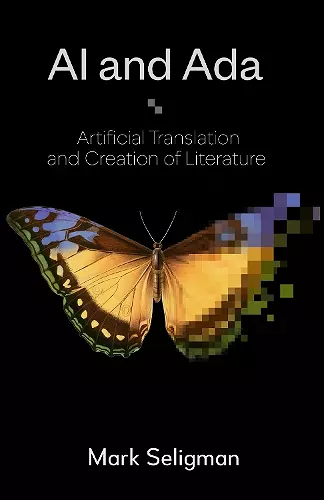AI and Ada
Artificial Translation and Creation of Literature
Format:Paperback
Publisher:Anthem Press
Published:7th Oct '25
Should be back in stock very soon
This paperback is available in another edition too:
- Hardback£80.00(9781839994371)

Taking recent spectacular progress in AI fully into account, this book explores prospects for artificial literary translation and composition, with frequent reference to the hyperconscious literary art of Vladimir Nabokov. The exploration balances reader-friendly explanation (“What are transformers?”) and original insights (“What is intelligence?” “What is language?”) with personal and playful notes.
Numerous examples and demos add appeal. Widely varying human and artificial translations of Russian and French poetry selections are presented. In-depth but approachable explanation of generative AI is complemented by insightful artificial essays on an evocative Nabokov poem, capped by an original and moving artificial parody or tribute.
This volume first explores the potential of machine translation of literature; goes on to explore possibilities for artificial literary creation; and finishes by assessing recent spectacular progress in generative artificial intelligence (AI) – throughout, with reference to Vladimir Nabokov’s hyperconscious literary art.
The book’s Preface places the current AI explosion in the context of other technological cataclysms and recounts the author’s personal (and not always deadly serious) AI journey. Chapter One (“Extracting the Essence”) assesses the potential of machine translation of literature, exploiting Vladimir Nabokov’s hyperconscious literary art as a reference point. Chapter Two (“Toward an Artificial Nabokov”) goes on to speculate on possibilities for actual artificial creation of literature. Chapter Three (“Large Literary Models? Intelligence and Language in the LLM Era”) explains recent spectacular progress in Generative Artificial Intelligence (GenAI), as exemplified by Large Language Models like ChatGPT. On the way, the chapter ventures to tackle perennial questions (“What is intelligence?” “What is language?”) and culminates in an assortment of striking demos. The volume’s Sendoff considers whether machines, while now arguably intelligent, can ever also gain sufficient sensation and emotion to create language art with other than borrowed depth – and, while viewing this development as likely all too soon, declines to despair on that account.
This book was written by a human, a curious, breezily autobiographical human, who has been involved for many decades in the long struggle of computer language processing and machine translation. He presents the surprise—his as much as anyone’s—of recent Chat-GPT-level AI’s sudden bursting onto not just the verbal but the literary scene. He shows it can now translate Pushkin almost as literally as Nabokov could or as artistically as other human translators. It can understand a Nabokov poem as well as most critics, and write an imitation of it under the authorial human’s own highly individual autobiographical prompts. Curiouser and curiouser, and kudos to MS, VN, and AI. This blurb was written by a human, BB, I don’t know why they needed me. — Brian Boyd, University Distinguished Professor Emeritus, University of Auckland, New Zealand; Author of Nabokov’s Ada: The Place of Consciousness
What a fun read! A whimsical autobiographical journey through the history of machine translation from the first row seat of someone who has been there all along, with lots of musings about the challenges of translating literature—from using punch cards to ChatGPT. — Philipp Koehn, Professor at the Johns Hopkins University, Baltimore, MD, USA. Author of Neural Machine Translation
Mark Seligman offers a thoughtful and nuanced exploration of the intersections between AI, translation, and literary creativity. AI and Ada is a welcome and timely contribution to the conversation about how machines interact with human language. It challenges assumptions, expands possibilities, and reminds us that artistry remains a deeply human aspiration even in an AI-driven world. — Renato Beninatto, Chairman of the Board, Nimdzi Insights; Editor of the periodical Multilingual Computing
An engaging read, this chapter brilliantly weaves literary analysis, particularly of Nabokov, with a deep dive into artificial intelligence. The author’s use of classic translation debates and creative examples effectively illustrates that today’s AI has a surprising capacity for “understanding” and artistic generation, sparking fascinating reflections on the intersection of technology and art. —Mike Dillinger, PhD, former president of the Association for Machine Translation for the Americas, and manager, Taxonomy Team and Machine Translation. Co-authored with Mark Seligman many papers on the Converser for Healthcare speech translation prototype.
ISBN: 9781839994388
Dimensions: 216mm x 140mm x 13mm
Weight: 279g
236 pages